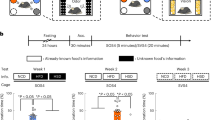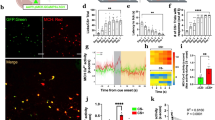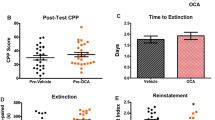Abstract
BACKGROUND: The synthetic melanocortin (MC) agonist, melanotan-II (MTII), reduces food intake and body weight for hours to days after administration. One early report on the effect of MTII suggested that part of its anorexic action may be mediated by aversive consequences. In that experiment, MTII was found to support a mild conditioned taste aversion (CTA).
OBJECTIVE: The present experiments replicate and extend those findings in two additional CTA paradigms to further characterize the aversive effects of MTII in rats.
METHODS: Experiment 1 simultaneously assessed the ability of MTII to support CTA and reduce food intake, using a small oral infusion of a novel taste as the conditioned stimulus. Experiment 2 assessed the aversive consequences of chronic MTII administration. To accomplish this, we paired implantation of lithium chloride (LiCl)-, MTII- or saline-containing osmotic minipumps with a constantly available novel flavor. After 7 days, rats received a choice test between the minipump-paired flavor and a previously available neutral flavor.
RESULTS: Rats with saline minipumps exhibited no preference for either flavor. By contrast, rats in both the LiCl and MTII minipump groups significantly preferred the neutral flavor, indicating the development of a CTA. Additionally, CTA produced by administration of MTII was found to be more resistant to extinction than that produced by LiCl.
CONCLUSIONS: The reduction in food intake caused by MTII is accompanied by aversive consequences regardless of route of administration. These results present difficulties for the development of MCs-based therapies for obesity.
This is a preview of subscription content, access via your institution
Access options
Subscribe to this journal
Receive 12 print issues and online access
$259.00 per year
only $21.58 per issue
Buy this article
- Purchase on Springer Link
- Instant access to full article PDF
Prices may be subject to local taxes which are calculated during checkout







Similar content being viewed by others
References
Thiele T, van DG, Yagaloff K, Fisher S, Schwartz M, Burn P, Seeley R . Central infusion of melanocortin agonist MTII in rats: assessment of c-Fos expression and taste aversion. Am J Physiol 1998; 274: R248–R254.
Tsujii S, Bray GA . Acetylation alters the feeding response to MSH and beta-endorphin. Brain Res Bull 1989; 23: 165–169.
Fan W, Boston B, Kesterson R, Hruby V, Cone R . Role of melanocortinergic neurons in feeding and the agouti obesity syndrome. Nature 1997; 385: 165–168.
Schwartz MW, Seeley RJ, Weigle DS, Burn P, Campfield LA, Baskin DG . Leptin increases hypothalamic proopiomelanocoritin (POMC) mRNA expression in the rostral arcuate nucleus. Diabetes 1997; 46: 2119–2123.
Mizuno T, Kleopoulos S, Bergen H, Roberts J, Priest C, Mobbs C . Hypothalamic pro-opiomelanocortin mRNA is reduced by fasting and in ob/ob and db/db mice, but is stimulated by leptin. Diabetes 1998; 47: 294–297.
Bergendahl M, Wiemann JN, Clifton DK, Huhtaniemi I, Steiner RA . Short-term starvation decreases POMC mRNA but does not alter GnRH mRNA in the brain of adult male rats. Neuroendocrinology 1992; 56: 913–920.
Thornton JE, Cheung CC, Clifton DK, Steiner RA . Regulation of hypothalamic proopiomelanocortin mRNA by leptin in ob/ob mice. Endocrinology 1997; 138: 5063–5067.
Huszar D, Lynch C, Fairchild-Huntress V, Dunmore J, Fang Q, Berkemeier L, Gu W, Kesterson R, Boston B, Cone R, Smith F, Campfield L, Burn P, Lee F . Targeted disruption of the melanocortin-4 receptor results in obesity in mice. Cell 1997; 88: 131–141.
Seeley R, Yagaloff K, Fisher S, Burn P, Thiele T, van DG, Baskin D, Schwartz M . Melanocortin receptors in leptin effects. Nature 1997; 390: 349.
Cone RD (ed) The melanocortin receptors.Totowa, NJ: Humana Press; 2000.
Cone RD . The central melanocortin system and energy homeostasis. Trends Endocrinol Metab 1999; 10: 211–216.
Woods SC, Seeley RJ . Adiposity signals and the control of energy homeostasis. Nutrition 2000; 16: 894–902.
Bures J, Bermudez-Rattoni F, and Yamamoto T . Conditioned taste aversion: Memory of a special kind. New York: Oxford University Press; 1998.
Hoebe C, de Munter J, Thijs C . Adverse effects and compliance with mefloquine or proguanil antimalarial chemoprophylaxis. Eur J Clin Pharmacol 1997; 52: 269–275.
Wessells H, Levine N, Hadley ME, Dorr R, Hruby V . Melanocortin receptor agonists, penile erection, and sexual motivation: human studies with Melanotan II. Int J Impot Res 2000; 12: S74–S79.
Wessells H, Gralnek D, Dorr R, Hruby VJ, Hadley ME, Levine N . Effect of an alpha-melanocyte stimulating hormone analog on penile erection and sexual desire in men with organic erectile dysfunction. Urology 2000; 56: 641–646.
Wessells H, Fuciarelli K, Hansen J, Hadley ME, Hruby VJ, Dorr R, Levine N . Synthetic melanotropic peptide initiates erections in men with psychogenic erectile dysfunction: double-blind, placebo controlled crossover study. J Urol 1998; 160: 389–393.
Cowley MA, Smart JL, Rubinstein M, Cerdan MG, Diano S, Horvath TL, Cone RD, Low MJ . Leptin activates anorexigenic POMC neurons through a neural network in the arcuate nucleus. Nature 2001; 411: 480–484.
Mizuno TM, Makimura H, Silverstein J, Roberts JL, Lopingco T, Mobbs CV . Fasting regulates hypothalamic neuropeptide Y, agouti-related peptide, and proopiomelanocortin in diabetic mice independent of changes in leptin or insulin. Endocrinology 1999; 140: 4551–4557.
Benoit SC, Schwartz MW, Baskin DG, Woods SC, Seeley RJ . CNS melanocortin system involvement in the regulation of food intake and body weight. Hormones Behav 2000; 37: 299–308.
Dorr RT, Lines R, Levine N, Brooks C, Xiang L, Hruby VJ, Hadley ME . Evaluation of melanotan-II, a superpotent cyclic melanotropic peptide in a pilot phase-I clinical study. Life Sci 1996; 58: 1777–1784.
Chavez M, Seeley RJ, Woods SC . A comparison between the effects of intraventricular insulin and intraperitoneal LiCl on three measures sensitive to emetic agents. Behav Neurosci 1995; 109: 547–550.
Author information
Authors and Affiliations
Corresponding author
Additional information
Department of Cell Biology, Neurobiology and Anatomy, University of Cincinnati Medical Center, Cincinnati, OH, USA
Rights and permissions
About this article
Cite this article
Benoit, S., Sheldon, R., Air, E. et al. Assessment of the aversive consequences of acute and chronic administration of the melanocortin agonist, MTII. Int J Obes 27, 550–556 (2003). https://doi.org/10.1038/sj.ijo.0802280
Received:
Revised:
Accepted:
Published:
Issue Date:
DOI: https://doi.org/10.1038/sj.ijo.0802280



